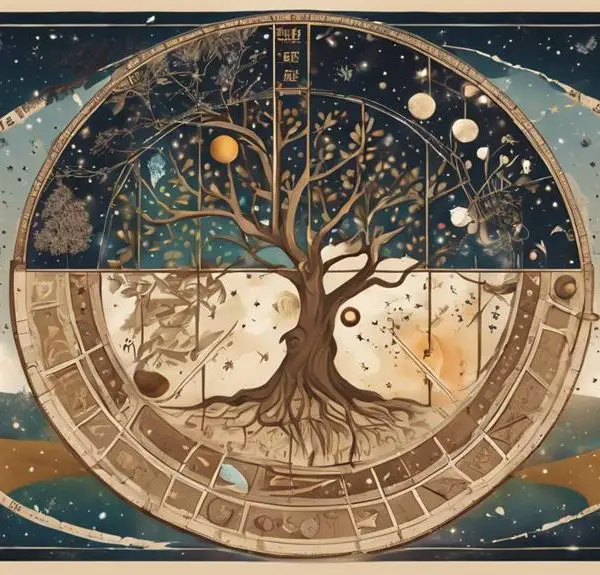Consider the fascinating concept of 'unfallen worlds' in the Bible, realms untouched by sin, offering a fresh perspective on God's creation.

Unfallen Worlds in the Bible
In the shadows of sin and redemption, you find the concept of 'unfallen worlds' in the Bible quite fascinating. It's not a topic that's usually front and center in biblical discussions, yet it's brimming with theological implications.
Imagine, the possibility of realms untouched by the fall of man, a stark contrast to our flawed reality. How do these unfallen worlds fit into our understanding of God's creation?
You're left pondering, intrigued to know more, to explore deeper into the scripture and its mysteries.
Key Takeaways
- Biblical passages suggest the existence of unfallen worlds, expanding our understanding of divine cosmology.
- The angelic realms and divine hierarchy exemplify these sinless realities, influencing spiritual perceptions.
- Prophetic visions reinforce hope for redemption and restoration, painting a contrast between fallen and unfallen realities.
- The concept of unfallen worlds challenges and enriches Christian beliefs, redefining sin and grace while emphasizing restorative practices.
Biblical Verses Supporting Unfallen Worlds

In order to comprehend the biblical concept of unfallen worlds, it's crucial to delve into specific verses that seemingly support this idea. You may find it fascinating to explore the book of Job, as it hints at the existence of other worlds. Job 1:6-7 describes a gathering of the 'sons of God,' possibly indicating a divine cosmology teeming with life beyond Earth.
Analyzing the Bible from an extraterrestrial faith perspective, you might draw parallels between these verses and the concept of unfallen worlds. Could these 'sons of God' be inhabitants of such worlds, untouched by sin? It's a compelling thought, isn't it?
Furthermore, Isaiah 45:18 asserts that God didn't create the Earth to be empty, but to be inhabited. Could this principle extend to other planets, other galaxies? It's a tantalizing possibility that expands the scope of divine cosmology, infusing it with an interstellar dimension.
Angelic Realms: Pure and Unblemished

Moving beyond the physical worlds, let's turn our attention to the angelic realms, which are often depicted as pure and unblemished in biblical scriptures. These celestial spheres, home to divine manifestations, are of immense importance in understanding the theological and soteriological implications of unfallen worlds.
The angelic hierarchy, as delineated in the Bible, presents a structured yet fluid spiritual realm. At the apex, you'll find Seraphim, the highest order of angels, who incessantly praise God and represent His love. Cherubim, known for their wisdom, guard Eden's entrance with a flaming sword. Thrones, the third tier, are angels of humility and peace. These celestial beings, in their unmarred state, mirror the purity and sanctity of divine realms.
These angelic realms, untouched by sin, serve as a stark contrast to our fallen world. They offer insight into God's original, unblemished design for creation. However, it's essential to remember that these realms aren't merely abstract theological concepts. They're active participants in God's cosmic drama, intermediaries between the divine and human realms, shaping spiritual realities and influencing earthly events.
Prophetic Visions of Unfallen Realities

Let's delve into the prophetic visions of unfallen realities, a fascinating lens through which the Bible gives us glimpses of worlds untainted by sin and corruption. Here, the Visionary Impact is profound, offering insights into realities that transcend our flawed human understanding.
The Bible, through its prophetic authenticity, portrays worlds in their original, unfallen state – pure, perfect, and untouched by the blemish of sin. Isaiah's vision of the peaceable kingdom, for instance, depicts a world where harmony reigns, a stark contrast to the strife-ridden world we know.
This prophetic authenticity isn't just a spiritual concept; it's a narrative tool used to heighten the contrast between the fallen and unfallen realities. It underscores the tragic magnitude of humanity's fall from grace, enhancing the Visionary Impact of the Bible's message.
These prophetic visions serve to reinforce the hope of redemption, a return to the unfallen realities. They're not mere utopian dreams but divine promises. As you analyze these visions, you'll appreciate the depth of their implications for understanding God's plan for the restoration of creation – a plan that aims to restore the world to its original, unfallen state.
Exploring Theological Interpretations

Building on the prophetic visions of unfallen realities, we can now turn our attention to the exploration of theological interpretations within the Bible. Delving into these interpretations, you'll uncover how divine attributes and theodicy perspectives can shape our understanding of unfallen worlds.
To visualize this, consider the following table:
Divine Attributes |
Theodicy Perspectives |
Biblical Interpretation |
|---|---|---|
Omnipotence |
Free Will |
Genesis 1:27 |
Omniscience |
Natural Evil |
Romans 8:19-22 |
Omnibenevolence |
Moral Evil |
Genesis 3:1-7 |
Immutability |
Divine Punishment |
Genesis 3:14-19 |
Eternity |
Divine Foreknowledge |
Revelation 21:1-4 |
Each row aligns a divine attribute with a theodicy perspective and a corresponding biblical interpretation. The omnipotence of God, for instance, is reflected in His creation of humanity with free will (Genesis 1:27). Similarly, God's omniscience is evident in the Pauline epistles, which speak of a cosmic redemption from natural evil (Romans 8:19-22).
Interpreting these theological concepts in light of unfallen worlds raises complex questions, deepening our biblical comprehension and enriching theological discourse.
Implications for Christian Belief and Practice

Drawing on these theological interpretations, you may find that the concept of unfallen worlds has profound implications for Christian belief and practice. The idea of cosmic redemption isn't merely confined to terrestrial realms, but extends to the entire cosmos, challenging the traditional anthropocentric view of salvation. This cosmic perspective amplifies the grandeur of God's redemptive work, encompassing not only humanity but also the unfallen worlds in their original purity.
Moreover, the belief in unfallen worlds could redefine the Christian understanding of sin and grace. If other worlds exist in their original purity, untouched by sin, it suggests that sin isn't an inherent aspect of creation, but a deviation from God's original design. Thus, the emphasis shifts from a punitive understanding of sin to a restorative concept of grace, reinforcing the hope for cosmic redemption.
The implications for Christian practice are significant. It encourages a broader sense of stewardship, beyond caring for our own planet. It also fosters a humble attitude towards the universe, acknowledging that humanity isn't the center of God's creation. Thus, the concept of unfallen worlds potentially enriches Christian spirituality, fostering a more cosmic faith that resonates with contemporary scientific cosmology.
Frequently Asked Questions
What Scientific Evidence Supports the Existence of Unfallen Worlds?"
There's no scientific evidence supporting the existence of unfallen worlds. These concepts are interpretations based on biblical references, not physical exploration or empirical science.
You'd find it challenging to provide tangible proof for such a spiritual idea. The idea of unfallen worlds is more a theological concept than a scientifically proven reality.
It's a fascinating thought, but it's not something science can verify or disprove.
Are There Any Major Church Denominations That Specifically Acknowledge Unfallen Worlds?"
You're asking if any major church denominations specifically recognize unfallen worlds. It's not a typical area of doctrine, so it's hard to find explicit acknowledgement.
The concept of unfallen worlds is more of a personal interpretation stemming from biblical references exploration. It's not commonly addressed in mainstream theology, but individual interpretations may vary widely.
It's best to check with individual denominations for their stance.
How Does the Concept of Unfallen Worlds Fit Into Other Religious Traditions Outside of Christianity?"
In exploring unfallen worlds outside Christianity, you'll find varied interpretations. Islam doesn't explicitly mention 'unfallen worlds', yet it acknowledges other worlds exist.
Buddhism, on the other hand, doesn't necessarily talk about 'unfallen worlds'. Instead, it explores realms of existence, each with its own karma.
What Are the Common Criticisms or Objections to the Theory of Unfallen Worlds?"
You might encounter criticisms of the 'Unfallen Worlds' theory that challenge its interpretation and the examination of biblical texts. Critics often argue there's no explicit mention of such worlds in the scriptures. They might also say it's speculative theology, relying heavily on readings between the lines rather than clear biblical evidence.
Disagreement on this theory could stem from differing views on biblical interpretation and the scope of God's creation.
Could the Existence of Unfallen Worlds Have Implications for Our Understanding of Extraterrestrial Life?"
Yes, the existence of unfallen worlds could reshape your understanding of extraterrestrial life. It could expand current alien theology implications.
It'd challenge traditional biblical interpretations, introducing variations that include the possibility of sinless extraterrestrial beings.
This idea could greatly influence future theological discourse and our perception of the universe.
It's a thought-provoking concept that invites you to explore and ponder over the potential expansiveness of God's creation.
Conclusion
Your exploration of unfallen worlds in the Bible has taken you on a fascinating journey. From biblical verses to prophetic visions, from angelic realms to theological interpretations, you've delved deep into this intriguing concept.
As a Christian, understanding these pure, unblemished realities can deeply impact your beliefs and practices. As you continue your spiritual journey, remember these unfallen worlds, and let them inspire you towards a purer, more faithful existence.



Sign up